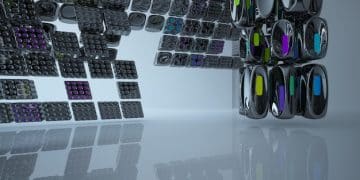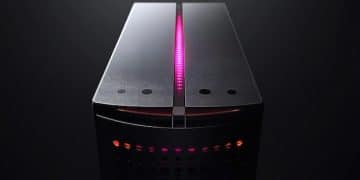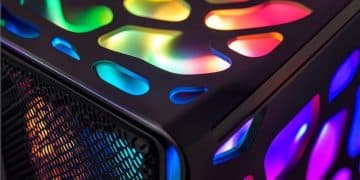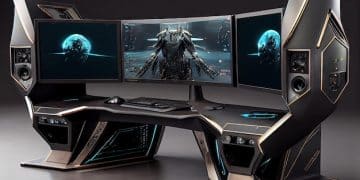Is Your PC Ready for 2025? Benchmark Tests & Upgrade Guide
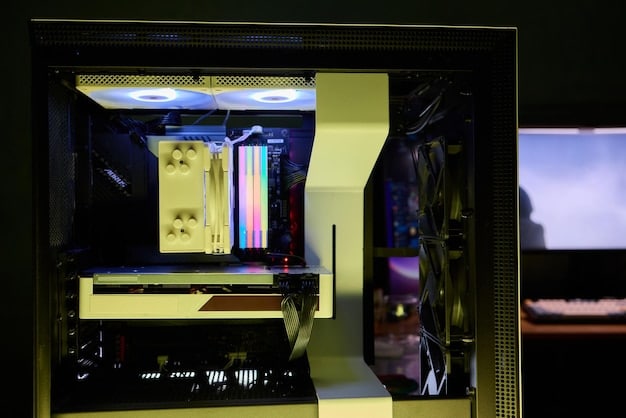
Preparing your PC for the next generation of gaming involves understanding benchmark tests, identifying hardware bottlenecks, and strategically planning upgrades to ensure compatibility and optimal performance in 2025.
As we approach 2025, the demands on PC gaming hardware are set to escalate. Is your current rig up to the challenge? This guide covers essential benchmark tests and upgrade strategies to ensure your PC is ready for the next generation of gaming, focusing on Is Your PC Ready for the Next Generation? Benchmark Tests and Upgrade Strategies for 2025.
Understanding the Evolving Demands of PC Gaming
The world of PC gaming is constantly evolving. New games push the boundaries of graphical fidelity and require increasingly powerful hardware to run smoothly. Understanding these evolving demands is crucial for ensuring your PC remains capable of delivering a great gaming experience in the years to come. Let’s explore some factors driving the need for upgrades.
The Impact of New Game Engines
Advancements in game engine technology, like Unreal Engine 5, introduce stunning visual effects and more complex game worlds. These new features come at a cost, demanding significantly more processing power from your CPU and GPU. Understanding what your favorite upcoming games will require is key to planning accordingly.
The Rise of Ray Tracing and Advanced Graphics
Ray tracing, a rendering technique that simulates the physical behavior of light, adds unprecedented realism to games. However, it’s incredibly resource-intensive. Advanced graphics options are becoming more widespread and need to be considered.
- Evaluate your current hardware: Run benchmarks to determine performance baseline.
- Research upcoming game requirements: Identify the games you plan to play and their recommended specs.
- Monitor hardware trends: Stay informed about new GPUs, CPUs, and other components.
Keeping abreast of technology and trends is vital to deciding if you need an upgrade. Ignoring these advancements can leave your PC struggling to keep pace, so be prepared.
Benchmark Testing: Assessing Your PC’s Current Performance
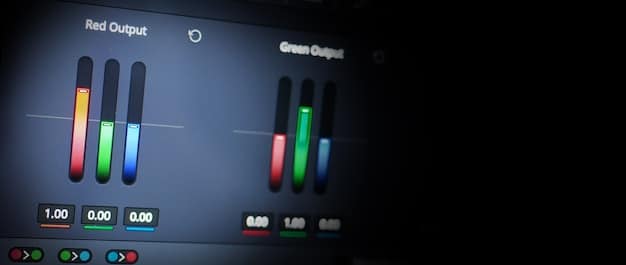
Before considering any upgrades, it’s essential to accurately assess your PC’s current performance. Benchmark testing provides a standardized way to measure your hardware’s capabilities, helping you identify potential bottlenecks and areas for improvement. These tests give you a tangible number to work with and compare against.
Popular Benchmarking Tools
Several excellent benchmarking tools are available, each designed to test different aspects of your system. Some popular options include 3DMark for graphics, Cinebench for CPU, and CrystalDiskMark for storage.
Interpreting Benchmark Results
Understanding the results of your benchmark tests is just as important as running them. Compare your scores to those of other users with similar hardware. This can help give you an indication to what needs the most attention.
- CPU Benchmarks: Focus on multi-core scores for gaming performance.
- GPU Benchmarks: Pay attention to frame rates in demanding games.
- RAM Benchmarks: Ensure your memory is performing at its rated speed.
If your scores are lower than expected for your hardware configuration, investigate potential issues like driver problems, overheating, or background processes consuming resources.
Identifying Hardware Bottlenecks
The term “bottleneck” refers to a component that limits the performance of other, more powerful components in your system. Identifying these bottlenecks is crucial, allowing you to efficiently target your upgrade efforts and maximize your gaming experience. Let’s explore how you spot them.
CPU vs. GPU Bottlenecks
Determining whether your CPU or GPU is the bottleneck requires careful observation and testing. If your CPU usage is consistently high while your GPU usage is low, your CPU is likely the bottleneck. Conversely, high GPU usage and low CPU usage point to a GPU bottleneck.
RAM and Storage Bottlenecks
Insufficient RAM can lead to stuttering and slowdowns, especially in memory-intensive games. Slow storage devices, like traditional hard drives, can significantly impact game loading times and overall system responsiveness. You should consider swapping these out for faster options.
Recognizing limitations in processing power is a key factor in identifying hardware bottlenecks in your system. Understanding what is holding you back will make the upgrade progress smoother, hopefully.
Strategic Upgrade Planning: Maximizing Your Budget

Upgrading your PC can be a significant investment, so it’s essential to plan strategically to maximize your budget. Prioritize the components that will provide the most noticeable performance gains for your specific gaming needs. Consider these important guidelines to keep in mind.
Prioritizing Key Components
For most gamers, the GPU is the most important component for gaming performance. Upgrading your GPU will generally result in the most significant improvement in frame rates and visual quality. After this, you also need consider your RAM.
Balancing Performance and Cost
It’s tempting to buy the most expensive hardware, but diminishing returns often kick in at the high end. Focus on finding the sweet spot where performance gains justify the cost, and don’t forget to shop around for deals and discounts.
Compatibility Considerations
Before purchasing any new hardware, ensure it’s compatible with your existing system. Check the socket type of your motherboard before buying a new CPU, and make sure your power supply can handle the increased power demands of a new GPU. Failing to do so will cause headaches and returns.
Planning ahead and considering all these facts can help you stretch your budget and guarantee you get the maximum results for what you spent on your new upgrades.
Upgrading Your CPU and Motherboard
Upgrading your CPU can provide a significant boost to overall system performance, especially in CPU-intensive games and tasks. However, upgrading your CPU often requires replacing your motherboard as well, as different CPUs use different socket types. Consider this decision carefully before committing to a new CPU.
Choosing the Right CPU
When selecting a new CPU, consider the number of cores, clock speed, and cache size. For gaming, a CPU with at least six cores and a high clock speed is generally recommended. Look into CPUs that are designed for gaming, sometimes they are more efficient.
Selecting a Compatible Motherboard
Ensure the motherboard you choose is compatible with your new CPU’s socket type and supports the features you need, such as PCIe 4.0 for modern GPUs and sufficient RAM slots. Double check that these all align.
- Research CPU benchmarks: Compare performance of different CPUs in gaming.
- Check motherboard compatibility: Ensure the motherboard supports your CPU and other components.
- Consider future upgrades: Choose a motherboard with expandability for future upgrades.
A good CPU can future proof your PC. Research properly and find a CPU that best fits your needs going forward. Don’t be afraid to ask for help from people that have built PCs before!
Optimizing Your System for Next-Gen Gaming
Beyond hardware upgrades, there are several steps you can take to optimize your system for next-generation gaming. These optimizations can improve performance, reduce input lag, and enhance your overall gaming experience. Let’s take a look at some of these ways.
Driver Updates and Software Optimization
Keep your graphics drivers up to date to ensure you’re getting the best possible performance from your GPU. Regularly update your operating system and other software to patch security vulnerabilities and improve stability.
Overclocking (Proceed with Caution)
Overclocking your CPU and GPU can provide a performance boost, but it also increases the risk of overheating and instability. Proceed with caution and only overclock if you’re comfortable with the risks involved.
Optimizing software can free up processing power and improve quality overall. Make sure you do these steps if you’re considering upgrading!
| Key Point | Brief Description |
|---|---|
| 🎮 Benchmark Testing | Assess your PC’s current performance with tools like 3DMark and Cinebench. |
| ⚙️ Identify Bottlenecks | Determine if your CPU, GPU, RAM, or storage is limiting performance. |
| 💰 Strategic Upgrades | Prioritize upgrades based on your budget and the components needing the most improvement. |
| 🛠️ System Optimization | Update drivers, optimize software, and consider overclocking (with caution) to maximize performance. |
FAQ
▼
Benchmark testing assesses your PC’s performance under standardized conditions. It’s crucial to identify bottlenecks and determine if your hardware meets the requirements for upcoming games, ensuring a smooth gaming experience.
▼
Monitor your CPU and GPU usage during gameplay. If one component is consistently at 100% while the other is low, the fully utilized component is likely the bottleneck, limiting overall performance.
▼
Generally, upgrading the GPU provides the most significant performance boost for gaming. If your CPU is older, upgrading it may also improve overall system responsiveness and prevent bottlenecks with a new GPU.
▼
Overclocking can improve performance but increases the risk of overheating and instability. Ensure you have adequate cooling and proceed with caution. Research safe overclocking parameters for your specific hardware models.
▼
Update your graphics drivers regularly, especially before playing new games. Driver updates often include performance optimizations and bug fixes that can significantly improve your gaming experience and stability.
Conclusion
As 2025 approaches, preparing your PC for the next generation of gaming involves a combination of careful assessment, strategic upgrades, and diligent optimization. By understanding the demands of upcoming games, identifying hardware bottlenecks, and planning your upgrades wisely, you can ensure your PC remains a powerful and enjoyable gaming platform for years to come.

